25 Common Mistakes Students Make on the GMAT (and How to Avoid Them)

Getting a high GMAT score is all about thinking clearly under pressure.
This is because the GMAT Focus Edition doesn’t reward rote memorization; it measures how well you reason, make decisions, and manage time when it counts.
And most students don’t struggle because they lack ability, but because they repeat small strategy errors that quietly drag their scores down.
That’s why identifying and correcting these mistakes early is a game-changer.
Once you learn to spot your weak patterns and apply focused fixes, the way GURUTOR’s GMAT test prep system teaches you to do, your score naturally rises.
Avoiding these pitfalls isn’t about perfection; it’s about precision.
Let’s break down the 25 common mistakes students make on the GMAT and how to avoid them so you can perform at your full potential.
Mistakes in the GMAT Quantitative Section (and How to Avoid Them)
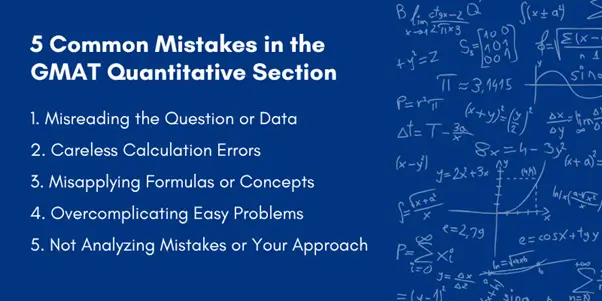
The Quantitative Reasoning section is where even math-savvy students can trip up.
Here’s how to avoid GMAT mistakes in the Quant section:
1. Misreading the Question or Data
Many students rush and misinterpret what’s being asked, solving for x instead of 2x, or missing a word like ‘not’.
To avoid this, slow down and reach each question twice, underline keywords, and restate what’s being asked in your own words.
Also, clearly define the target before testing statements. Careful reading prevents ‘silly’ errors that cost big points.
2. Careless Calculation Errors
A dropped negative or misplaced number can turn a correct answer into an incorrect one. For example, under time pressure, it’s easy for 3×3+4×1 to inadvertently become 9+5 in your notes.
For this, you can use scratch paper neatly and double-check simple steps before submitting. And review mistakes to identify patterns or frequent errors.
3. Misapplying Formulas or Concepts
A common mistake is memorizing formulas without understanding their application.
If you blindly apply a ‘memorized formula’ to a problem without grasping the logic, a small twist in the question can completely derail you.
For example, plugging numbers into the distance = rate × time formula won’t help if the question is actually about relative rates and you didn’t recognize the setup.
Focus on why a solution works, not just the formula. During practice, after solving a problem, ask yourself:
- Why was that the right approach?
- Could there be another method?
Also, ensure you have mastered the fundamentals (algebra, arithmetic, and geometry) so you don’t apply the wrong concept under pressure.
Thus, if a question looks complex, break it into smaller parts and confirm which principle applies. This way, you will avoid using the wrong tool for the job.
4. Overcomplicating Easy Problems (and Missing Traps)
Sometimes students assume every question must be hard, and overthink simple ones. Other times, they fall for traps that hinge on subtle details.
To avoid this, always double-check that your final answer addresses the actual question.
If a result seems too obvious, quickly scan for any hidden detail you might have overlooked (for example, an answer choice that matches a common miscalculation).
That said, staying alert to traps and keeping solutions as simple as possible will save you both time and errors.
5. Not Analyzing Mistakes or Adapting Your Approach
Many students grind through dozens of quant problems daily but keep making the same mistakes because they never pause to review.
Mindlessly completing hundreds of questions without a purposeful review is the surest path to a score plateau.
For example, doing five geometry questions wrong in a row teaches you nothing if you don’t investigate why.
Therefore, adopt a cycle of practice → review → adjust. Every time you finish a practice set or mock exam, spend as much time reviewing as you did solving.
Identify why each mistake happened, was it a concept gap or a careless slip, so you don’t keep falling into the same traps.
Mistakes in the GMAT Verbal Section (and How to Avoid Them)
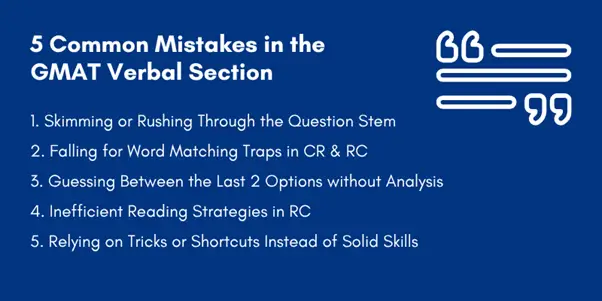
The Verbal Reasoning section (which includes Reading Comprehension and Critical Reasoning) poses its own set of challenges.
Many test-takers who are strong in English still find themselves getting tripped up by tricky wording or falling into common traps.
Here are frequent verbal mistakes and how to avoid them:
6. Skimming or Rushing Through the Question Stem
Under time pressure, it’s tempting to speed-read question stems or passages. However, misreading a single word can completely change the task.
For example, in Critical Reasoning, the word ‘support’ frequently appears in both inference and strengthen questions, but those question types ask for opposite things (one asks what must be true vs. what helps the argument).
To avoid this, always read the question stem fully and carefully, noting exactly what is being asked. Slow down for key words like ‘not’ or ‘except’ as the GMAT often uses them to flip the meaning.
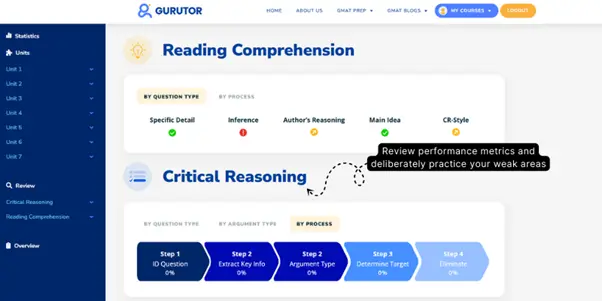
At this point, Gurutor steps in to help: if you skim too quickly, you might confuse an Inference question with a Strengthen question (or vice versa), leading you to choose an answer that solves the wrong problem.
7. Falling for Word Matching Traps in CR and RC
A very common mistake is to pick an answer because it uses the same phrasing or facts as the passage, assuming it must be correct since it sounds familiar.
In reality, they often make incorrect answer choices superficially attractive by using wording that matches the passage, while the correct answer is paraphrased or subtly worded differently.
So, if you latch onto answer (B) just because it contains a phrase straight from the passage, you might be ignoring that (B) actually distorts the passage’s meaning.
Therefore, to avoid this, engage in a deeper-level analysis of the answer choices. Ask yourself: Does this choice actually answer the question asked?
Often, trap answers will sound correct but either contradict the passage or answer a slightly different question.
So, focus on the meaning of each choice. It helps to predict an answer before looking at the options (especially in CR), so you have a sense of what you’re looking for.
8. Guessing Between the Last Two Options without Analysis
We’ve all been there: you eliminate three obviously wrong answers and are left torn between two choices that both look plausible.
Many students make the mistake of throwing up their hands and guessing at this point, often due to fatigue or frustration.
But don’t rely on gut instinct; expect the test to challenge your critical thinking at this stage. You must allocate a bit more thought to it rather than surrendering to a coin flip.
9. Inefficient Reading Strategies in RC
In Reading Comprehension, students often err at two extremes:
- Trying to memorize every detail of the passage on the first read
- Not reading the passage at all and just hunting for answers
The first approach wastes time and mental energy (nobody can recall every detail of a 350-word passage under pressure), and the second approach leaves you with no context to tackle inference or main idea questions.
In fact, skipping reading the passage generally adds time to your process; even though many think it saves time, it’s one of the biggest misconceptions about RC.
To avoid this mistake, read the passage once for basic understanding, grasp the main idea, tone, or purpose, and note where key details or examples are located.
Then, when you go to the questions, you’ll know roughly which part of the text likely holds the answer, and you can refer back as needed.
But don’t fall for the trap of either over-reading or under-reading initially.
10. Relying on Tricks or Shortcuts Instead of Solid Skills
There are plenty of so-called hacks floating around for GMAT Verbal, like always eliminating answers with extreme words (always, never, none) or reading the first question before the passage to know what to look for.
The reality is, while a few heuristics can be helpful, over-reliance on gimmicks is dangerous.
You need to build fundamental skills to avoid this mistake. Focus on grammar and meaning, logical analysis, and genuine reading skills for RC.
For CR, you might always identify the conclusion and evidence first before looking at the answers. Those are sound strategies, not gimmicks.
General GMAT Test-Taking Mistakes to Avoid
Beyond specific Quant or Verbal issues, there are general GMAT test-taking errors that can hinder your performance.
These are issues with how you manage the exam as a whole: timing, psychology, strategy, regardless of content.
Here are some of the most common general mistakes and how to avoid them:
11. Poor Time Management (Pacing Issues)
If you spend too long on some questions and run out of time at the end, your score will suffer severely.
Remember, the GMAT’s adaptive algorithm punishes unanswered questions heavily, so you cannot afford to leave questions blank.
Here’s how to tackle this mistake:
- Set a realistic prep timeline, around six months to prepare for the GMAT. This allows you to gradually master content and pacing.
- Before the exam, decide on a pacing plan. For example, 1.5-2 mins for each question. Having these checkpoints helps you quickly diagnose if you’re behind and need to adjust.
- Practice strategic abandonment, as it helps you avoid rushing through the last 5–7 questions, which can be disastrous.
- Stimulate and build stamina by practising full tests with no distractions, no mobile phones, and only short breaks.
With these time management techniques, you’ll avoid one of the most common GMAT fatal errors: running out of time.
12. Second-Guessing and Changing Answers Excessively
Another general mistake is constantly doubting your answers and changing them without good reason.
Keep in mind that the GMAT Focus edition allows limited review within each section (you can mark up to 3 questions for review and change their answers before moving on).
To fix this mistake, train yourself to be confident in your choices. Do the necessary work on each question when you are there, so you don’t rely on coming back later.
Only change an answer if you spot a concrete mistake in your original reasoning or a detail you missed. Avoid changes based on vague feelings.
13. Not Reviewing Practice Tests (Missing the Learning Opportunity)
Many students take practice exams and then only look at the score and maybe the percentiles. This is a huge missed opportunity.
It is important to note that mocks without review are wasted effort. The value of a practice test lies in the diagnosis and improvement that follow.
To avoid this, every time you do a mock exam, schedule at least a few hours the next day to review it in depth. Re-solve questions you got wrong or were unsure about without time pressure.
Understand why you erred, was it content, timing, careless mistake, or nerves? The patterns might surprise you.
14. Ignoring Section Directions and Test Protocols
This is less common, but worth noting.
Occasionally, students make mistakes like not understanding the format (e.g., not knowing that in Data Insights or Integrated Reasoning some questions have multiple parts to answer, or that you can’t return to a question in the GMAT adaptive section).
These logistical oversights can cost points; for example, if you didn’t realize a DI question had multiple statements to evaluate, you might inadvertently skip part of it.
To avoid this less common but worth noting mistake, familiarize yourself with the test format and interface beforehand, so you don’t violate any rules.
How to Avoid Burnout During GMAT Prep
Studying for the GMAT can take months, and the risk of burnout is real.
Burnout can manifest as fatigue, lack of motivation, poor retention of material, or even dread of studying, all of which can impact your progress.
Here are mistakes students make that lead to burnout, and how to avoid them:
15. Overstudying and Marathon Study Sessions
Some highly driven students equate success with sheer quantity of study hours; the more, the better.
And it’s not uncommon to hear of someone trying to study 6+ hours after a full workday. The determination is admirable, but this kind of studying is ineffective and absolutely miserable.
You reach a point of diminishing returns where you’re so tired that an hour of reading yields almost nothing learned. Plus, such a schedule is unsustainable and will exhaust you long before test day.
Try not to make this mistake by studying smarter, not just longer. Plan your study sessions to be intense but not overly long.
For example, you could do a 2-hour session on weeknights and 3-4 hours broken into chunks on weekends. During those sessions, eliminate distractions and truly concentrate, which means no phone, no multitasking, and clear goals for what to cover.
Remember that your brain needs time to recover and consolidate information. It’s like muscle training: you wouldn’t do heavy weightlifting every single day without rest days because you’d get injured or fatigued; the same logic applies to your mental prep.
16. Ignoring Your Physical and Mental Well-Being
When preparing for the GMAT, it is easy to slip into a pattern of cutting sleep to squeeze more study, skipping exercise, and isolating yourself from friends/family due to study guilt.
But getting your body right is as essential as getting your mind right for the GMAT.
Lack of sleep, poor nutrition, and high stress directly impair cognitive function; you’ll think more slowly, have trouble concentrating, and be more prone to anxiety (which can compound mistakes on test day).
To avoid this, make self-care non-negotiable. Consider the following ways:
- Schedule 7-8 hours of sleep as part of your study plan.
- Use exercise as a productive break (walking, yoga, or gym time)
- Eating well, staying hydrated, and practicing mindfulness can all keep your brain in top shape
- If you notice signs of burnout every time you try to study, take a step back.
- Consider studying in blocks (E.g., the Pomodoro technique: 50 minutes of study, 10 minutes of break).
Moreover, adaptive learning platforms like Gurutor can help prevent burnout by making your study time efficient and targeted. It ensures you’re not slogging through stuff you already know or endless repetitive questions.
17. Cramming and Last-Minute Overload
A specific form of burnout occurs in the final week(s) when students panic and try to do too much.
For example, attempting full-length practice tests every day right before the exam, or trying to learn an entirely new topic 48 hours out. This can lead to mental overload and exhaustion on test day.
In the last week, focus on review and light practice, not heavy learning.
And to avoid last-minute overload, don’t take a practice test the evening before the GMAT exam, as your brain needs to be fresh.
Instead, do something relaxing that night and trust the work you’ve put in.
How to Overcome Test Anxiety on the GMAT
Even if you’ve prepared thoroughly, test-day anxiety can strike and affect your performance.
Nerves can cause you to make mistakes you’d never make in practice. This is a common challenge among GMAT test-takers, and it’s natural to feel pressure.
Here’s how to overcome test anxiety mistakes:
18. Not Understanding the Impact of Anxiety
Test anxiety isn’t just in your head; it has real physiological effects. When you’re anxious, your body releases stress hormones that can interfere with concentration and memory.
It’s not just feeling nervous; anxiety can impair working memory, focus, and logical reasoning, meaning you might blank on things you know or misread simple questions because your mind is clouded.
Many test-takers who ignore this, focusing only on studying content and strategy, are surprised when stress derails them.
To avoid this, acknowledge that managing anxiety is part of your test prep. Don’t be ashamed if you experience it; almost everyone does to some extent.
The goal is to prevent a manageable level of nerves from escalating into panic that leads to mistakes. Thus, incorporate stress-reduction techniques into both your prep and test day.
19. Not Learning Techniques for Staying Calm During the Test
One effective method for on-the-spot anxiety reduction is controlled breathing.
For example, box breathing: inhale for 4 seconds, hold for 4 seconds, exhale for 4 seconds, hold for 4 seconds, as little as 30–60 seconds can reset your nervous system and clear your mind.
To avoid this, use the breaks wisely. During a break, don’t dwell on how the first section went; instead, do a quick breathing exercise or stretch to release tension.
Occasionally, take practice sections in a setting that makes you nervous (maybe in a library or somewhere slightly uncomfortable) so you learn to perform under less-than-ideal conditions.
20. Not Addressing Anxiety in Advance
If you know you have severe test anxiety (e.g., you’ve blanked out on past exams, or your practice test scores plummet in the test center environment), take proactive steps well before the GMAT.
This might mean practicing relaxation techniques daily, using visualization (imagine yourself taking the test calmly and successfully), or even seeking professional advice if needed.
And if you’re really anxious about a particular section (say, you fear you’ll freeze on Quant), create a very clear backup plan for yourself.
For example: ‘If I absolutely don’t know a question, I will not panic and I will eliminate what I can, guess, and move on.’
Remind yourself of this during the test if needed.
21. Leverage Confidence-Boosting Tools
Using a GMAT prep platform like Gurutor can indirectly help with anxiety as well. But how?
Gurutor provides real-time feedback and adaptive practice, which means by the time you face the actual GMAT, you’ve essentially had a tutor guiding you through your mistakes.
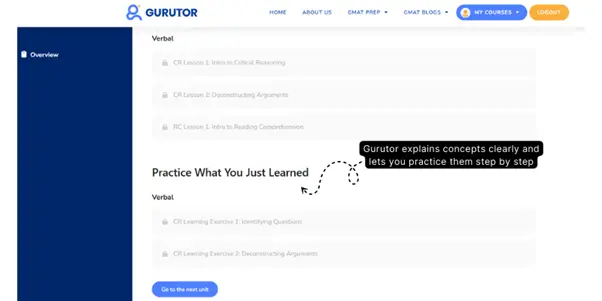
Also, you can use the official full-length GMAT practice exams that match the real exam format, increase in difficulty, and help you manage your pacing.
Essentially, knowledge is power: the more aware you are of how you perform and where you need work, the less fear of the unknown you have.
Mistakes in Strategy: Focusing on the Wrong GMAT Areas
Beyond the mechanics of solving questions and managing time, a strategic mistake students often make is studying inefficiently, focusing on the wrong things.
Your GMAT preparation should be driven by the areas that will yield the highest score gains, but many students either don’t know which areas those are or get stuck in less productive study habits.
Here are common strategic GMAT preparation mistakes and how to avoid them:
22. Obsessing Over Low-Yield Topics
It’s easy to feel productive mastering every obscure rule or edge-case concept, but the GMAT Focus rewards efficiency, not encyclopedic coverage.
Over-studying them steals valuable hours from high-yield areas such as algebraic reasoning, data interpretation, and argument evaluation, the skills that appear repeatedly across Quant and Verbal.
To avoid this, prioritize topics based on frequency and impact. Spend most of your prep time on recurring question types before polishing rarer ones.
23. Neglecting Your Weak Areas (or Your Strong Areas)
Students often err on one of two sides: either they avoid their weak sections because it’s uncomfortable, or they ignore their strengths, assuming those are good enough.
For example, if you’re already good at Reading Comprehension (RC), taking that from good to excellent could be easier and yield more points than trying to turn a very weak Critical Reasoning into a strength.
Conversely, bringing a lagging quant area (like inequalities or rates) up to average can significantly boost your quant score.
Therefore, take a balanced approach. Identify your top 2–3 weakest subtopics and make a plan to improve each.
Also, identify your top strengths and don’t neglect them; practice some hard questions in those areas to push the boundary.
For example, say you’re great at RC but weak at SC. You should dedicate time to drilling SC fundamentals and occasionally challenge yourself with a difficult RC passage to move from, say, the 700 to the 725 score.
24. Using Subpar or Too Many Study Resources
Another common strategic mistake is hopping between multiple books, courses, free questions online, etc., without consistency.
Or worse, using poor-quality materials that don’t reflect the real GMAT.
For example, some third-party practice questions are far easier or far harder (or just different in style) than actual GMAT questions.
Similarly, trying to use 5 different prep books usually causes more confusion than benefit; each might use different methods or even slightly different rules for grammar.
To avoid this, prep yourself with official GMAT questions and practice materials. Use the Official Guide and GMAC’s question packs/mock tests, since they are real questions.
Also, supplement these with Gurutor, a self-paced study platform that ensures you’re learning from official materials while getting guided solutions, just like a tutor by your side, 24/7.
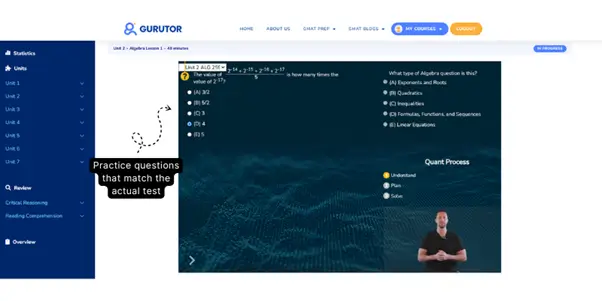
25. Chasing Perfection Instead of Progress
Lastly, perfectionism can be a strategic pitfall.
Some students become fixated on getting every question right in practice, or they feel they must reach a point where they never make mistakes.
This can lead to frustration and inefficient time use (e.g., spending 5+ minutes on a single hard problem just to solve it, which is not a realistic approach for a test day).
Thus, accept that mistakes will happen, and focus on learning from them rather than feeling defeated.
In your practice, sometimes it’s okay to cut bait on a question that’s really stumping you, check the explanation, and move on, internalize the lesson.
On the test day, if a question is unusually hard, remember that you can still achieve your target score and miss it. Don’t let perfectionism on one question impact your overall performance.
Success Stories from Real Gurutor Students
Nothing speaks louder than results. Gurutor has helped students unlock their potential and boost their GMAT scores, even after months of being stuck.
Frequently Asked Questions
What are the most common mistakes students make on the GMAT?
The most common GMAT mistakes stem from strategy, not ability. Here are the key ones and how to avoid them:
- Poor time management: Practice timed sections and set pacing checkpoints to avoid rushing or running out of time.
- Overlooking details: Read each question twice and underline key words like not, except, or least.
- Skipping practice tests: Take full-length mocks under real conditions to build stamina and refine pacing.
- Ignoring error review: Track mistakes in an error log to identify and fix recurring weaknesses.
- Relying on tricks over reasoning: Focus on understanding logic and process, not shortcuts or memorization.
- Uneven topic focus: Prioritize high-yield areas before niche topics to study efficiently.
How can I improve my GMAT score by avoiding mistakes?
You can boost your GMAT score by turning mistakes into learning tools. Review every error to understand why it happened, whether due to misreading, timing, or conceptual gaps, and adjust your strategy accordingly. This focused approach accelerates improvement and helps you build accuracy, confidence, and consistency faster.
What are the biggest mistakes in GMAT quant, and how can I avoid them?
The biggest GMAT Quant mistakes often come from strategy gaps, rather than math gaps. Here’s how to avoid them:
- Careless calculations: Double-check arithmetic and use organized scratch work to avoid sign or copy errors.
- Misreading questions: Read carefully for key words and ensure you’re solving for what’s actually asked.
- Overcomplicating problems: Look for simpler logic or estimation methods instead of lengthy algebra.
- Misapplying formulas: Focus on why a formula works to choose the right one under pressure.
- Repeating the same errors: Use adaptive learning tools like GURUTOR to analyze your mistakes, target weak areas, and get real-time feedback so you correct reasoning errors before they stick.
How can I avoid burnout while preparing for the GMAT?
To avoid burnout during GMAT prep, focus on balance and consistency over long study hours. Set realistic daily goals and include short breaks every 60–90 minutes to reset your focus. Schedule at least one rest day each week and rotate study topics to keep your mind engaged. Use adaptive learning techniques that adjust your study plan based on progress. Also, prioritize sleep, exercise, and proper nutrition to maintain energy and concentration throughout your prep.
Can mistakes on the GMAT verbal section hurt my score?
Yes, mistakes on the GMAT Verbal can lower your score, as each error reduces your accuracy rate. Common issues include overlooking key words, misinterpreting sentence meaning, or rushing through answer choices. To correct this, slow down just enough to understand sentence logic, practice identifying traps in Critical Reasoning and Reading Comprehension, and review every wrong answer to see why your reasoning failed.
How do I avoid making the same mistakes in GMAT practice tests?
To avoid repeating mistakes on GMAT practice tests, review each test strategically instead of just checking your score. Look for patterns in your errors, timing slips, misreads, or weak concepts, and note what caused them. Use an adaptive learning platform like Gurutor to pinpoint recurring weaknesses and adjust your study plan accordingly.
Conclusion: Turn Common GMAT Mistakes into a Smarter Study Strategy
The GMAT isn’t a test of how much you know; it’s a test of how well you think under pressure. And that’s exactly why avoiding common mistakes is the real game-changer.
Every careless error, timing slip, or unreviewed weakness is a missed chance to show your reasoning ability. But once you start studying smarter, analyzing what went wrong, and fixing it fast, you shift from simply practicing to truly improving.
This mindset turns frustration into progress. You’ll pace yourself better, double-check assumptions, and approach each question with clear reasoning.
And when test day comes, you’ll walk in calm, confident, and in control because you’ve trained your thinking, not just your memory.
Every error you learn from is a point gained, a skill strengthened, and a step closer to your target score. So, master your process, and the score will follow.
Your GMAT success story can be next!
The GMAT is a challenging exam, but it’s a beatable one when you approach it with the right strategies and mindset.
That’s how Gurutor helps you turn every practice session into real score gains, making your study time more efficient and results-driven.
Try Gurutor’s first GMAT unit for free!
